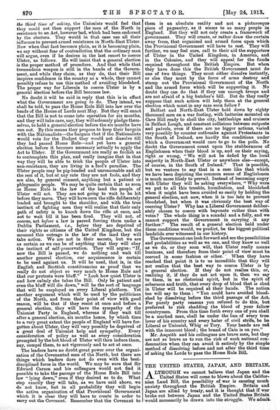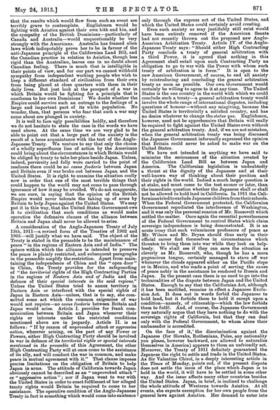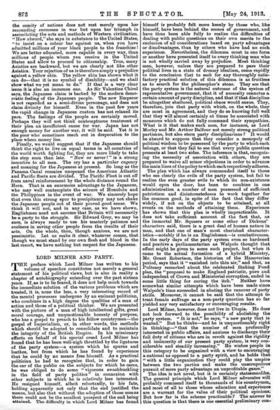THE UNITED STATES, JAPAN, AND BRITAIN. A LTHOUGH we cannot believe
that Japan and the United States will come to blows about the Califor- nian Land Bill, the possibility of war is causing much anxiety throughout the British Empire. Britain and Japan are allied by treaty, and it is thought that if war broke out between Japan and the United States Britain would necessarily be drawn into the struggle. We admit. that the results which would flow from such an event are terribly grave to contemplate. Englishmen would be fighting with Asiatics against their own kith and kin, and the sympathy of the British Dominions—particularly of Canada and Australia—would unquestionably be very strongly with the Americans. Australia has framed alien laws which indisputably prove her to be is favour of the anti-Japanese principle of the Californian Land Bill, and the Canadian practice in relation to Asiatics, though less rigid than the Australian, leaves one in no doubt about Canadian feeling. There is much that is intelligible in their points of view, and for our part we cannot withhold sympathy from independent working people who wish to keep a, different standard of civilization from their own from being placed at close quarters with them in their daily lives. But just look at the prospect of a war in which Britain would. be fighting for a principle that is anathema to her own Dominions ! We doubt whether the Empire could survive such an outrage to the feelings of a large and important part of its white population. No wonder, then, that persons who fear that such a war may come about are plunged in anxiety. It is well to face ugly possibilities boldly, and therefore we do not hesitate to state the case in the words we have used above. At the same time we are very glad to be able to point out that a large part of the anxiety is the result of a loose acquaintance with the text of the Anglo- Japanese Treaty. We venture to say that only the choice of a wholly superfluous line of action by the Americans could bring about the circumstances in which Britain would be obliged by treaty to take her place beside Japan. Unless, indeed, perversity and folly were carried to the point of madness there could. be no casus foederis between Japan and Britain even if war broke out between Japan and the United States. It is right to examine the situation coolly now in order that one of the most terrible things that could happen to the world. may not come to pass through ignorance of how it may be avoided. We do not exaggerate, we are sure, in saying that the opinion of the British Empire would never tolerate the taking up of arms by Britain to help Japan against the United States. We may put it in this way, that the United States Government owe it to civilization that such conditions as would make operative the defensive clauses of the alliance between Britain and Japan shall never be allowed. to arise.
A consideration of the Anglo-Japanese Treaty of July 13th, 1911—a revised form of the Treaties of 1902 and 1905—will justify what we have said. The object of the Treaty is stated. in the preamble to be the maintenance of peace " in the regions of Eastern Asia and of India." The sphere within which the alliance is intended to preserve the peace is plainly restricted, and subsequent paragraphs in the preamble amplify the restriction. Apart from main- taining the independence of China and the " open door " in China, the Treaty provides for the safeguarding of " the territorial rights of the High Contracting Parties in the regions of Eastern, Asia and of India and the defence of their special interests in the said regions." Unless the United States tried to annex territory in Eastern Asia or interfered with the special rights of Japan in Eastern Asia—unless, that is to say, she com- mitted some act which the common exigencies of war would not require—no casus foederis between Britain and Japan would arise. Article I. provides for frank com- munication between Britain and Japan whenever their rights or interests under the restricted conditions mentioned above are in jeopardy. Article II. is as follows : " If by reason of unprovoked attack or aggressive action, wherever arising, on the part of any Power or Powers, either High Contracting Party should be involved in war in defence of its territorial rights or special interests mentioned in the preamble of this Agreement, the other High Contracting Party will at once come to the assistance of its ally, and will conduct the war in common, and make peace in mutual agreement with it." That clause imposes precise limitations on the obligation of Britain to help Japan in arms. The attitude of California towards Japan obviously cannot be described as an " unprovoked attack " or " aggressive action " ; nor if Japan went to war with the United. States in order to exact fulfilment of her alleged treaty rights would Britain be required to come to her assistance. The operative condition of the Anglo-Japanese Treaty in fact is something which would come into existence only through the express act of the United States, and which the United States could certainly avoid creating. Even such anxiety as may justifiably still exist would. have been entirely removed if the American Senate had not recently thrown out the proposed new Anglo- American Arbitration Treaty. Article IV. of the Anglo- Japanese Treaty says : " Should. either High Contracting Party conclude a treaty of general arbitration with a third Power, it is agreed that nothing in this Agreement shall entail upon such Contracting Party an obligation to go to war with the Power with whom such treaty of arbitration is in force." It is open to the new American Government, of course, to end all anxiety by reintroducing and concluding the general arbitration treaty as soon as possible. Our own Government would certainly be willing to agree to it at any time. The United States is the one country in the world. with which we could. conclude such a treaty—a general arbitration treaty would involve the whole range of international disputes, including questions of honour—without any misgiving, because the United States is territorially a satisfied country, and has no desire whatever to change the status quo. Englishmen, however, need not be apprehensive that Britain will really be required to fight against the United States even without the general arbitration treaty. And, if we are not mistaken, when the general arbitration treaty was being discussed the Japanese Government informally expressed the opinion that Britain could never be asked to make war on the United States.
We have not intended in anything we have said to minimize the seriousness of the situation created by the Californian Land Bill as between Japan and America. The Californian legislation is undoubtedly a thrust at the dignity of the Japanese and at their well-known way of thinking about their position and their rights in the world. Indeed a much larger question is at stake, and must come to the test sooner or later, than the immediate question whether the Japanese shall or shall not be allowed to hold land in California. In 1911 the Cali- fornians tried. to exclude Japanese children from their schools. When the Federal Government protested, the Californian Government repudiated the interference of Washington, and it was only the personal suasion of Mr. Roosevelt which settled the matter. Once again the essential powerlessness of the Federal Government to control States which claim sovereign independence is being demonstrated. It is an acute irony that such voluminous professors of peace as Mr. Wilson and Mr. Bryan should thus early in their official career find themselves in circumstances which threaten to bring them into war while they look on help- lessly. We shall see if they can save the situation as cleverly as Mr. Roosevelt, who, though he has a more pugnacious tongue, certainly managed to stave off war whenever the clouds appeared either on the Pacific slope or in Mexico, and who made a point of serving the cause of peace nobly in the assistance be rendered to Russia and Japan. In the present case there is no need to go into the technicalities of the dispute between Japan and the United States. Enough to say that the Californian Act, although it has been modified, remains in effect a Japanese Exclu- sion Act. It does not in words forbid the Japanese to hold land, but it forbids them to hold it except upon a condition—namely, of citizenship—which the law forbids them to fulfil. And, of course, the Japanese Government very naturally argue that they have nothing to do with the sovereign rights of California, but that they can deal only with the Federal Government, to whom alone their ambassador is accredited.
On the face of it,' the discrimination against the Japanese (for Slovaks, Ruthenians, Poles, any nationality you please, however backward, are allowed to naturalize themselves in America) appears to them an unfriendly act. Moreover, the Treaty of 1911 definitely guaranteed the Japanese the right to settle and trade in the United States. As Sir Valentine Chirol, in a deeply interesting article in the Times of Monday, points out, if the present dispute does not settle the issue of the place which Japan is to hold in the world, it will have to be settled in some other way. And the issue affects many other countries besides the United States. Japan, in brief, is inclined to challenge the whole attitude of Westerns towards Asiatics. At all events, she expects exemption for her own people from the general laws against Asiatics. Her demand to enter into
the comity of nations does not rest merely upon her resounding successes in war but upon her triumph iu assimilating the arts and methods of Western civilization. "How absurd," she says in substance to the United States, " to insist on a colour bar against us, when you have admitted millions of your black people to the franchise ! We are better educated, more capable in every way, than millions of people whom you receive in the United States and allow to proceed to citizenship. True, many Asiatics are backward, but we are clearly not like other Asiatics. Your rejection of us is therefore simply a prejudice against a yellow skin. The yellow skin has shown what it can do—that it is no symbol of disability—and we shall show what we yet mean to do." If that is a very clear issue it is also an immense one. As Sir Valentine Chirol says, the Japanese claim is backed by the modern demo- cratic feeling of the Japanese people. The new Emperor is not regarded as a semi-divine personage, and does not claim divinity for himself. Even in the past few years the rapid change in Japanese custom has not relaxed its pace. The feelings of the people are certainly moved. Perhaps they will not think contemptuous treatment of their plea an insufficient cause for war. Japan has not enough money for another war, it will be said. Yet it is the poor who sometimes reach out in desperation to the place where money lies.
Finally, we would suggest that if the Japanese should think the right to live on equal terms in all countries of the world worth fighting for, they are more likely to take the step soon than late. " Now or never !" is a strong incentive to all men. The cry has a particular cogency and meaning for the Japanese at present. So long as the Panama Canal remains unopened the American Atlantic and Pacific fleets are divided. The Pacific Fleet is cut off from naval reinforcement by the whole distance round the Horn. That is an enormous advantage to the Japanese, who may well contemplate the seizure of Honolulu and the Philippines in the event of war. We sincerely hope that even this strong spur to precipitancy may not shake the Japanese people out of their proved good sense. We think it will not, and in any case, as we have shown, Englishmen need not assume that Britain will necessarily be a party to the struggle. Sir Edward Grey, we may be sure, is always ready to use his masterly patience and coolness in saving other people from the results of their acts. On the whole, then, though anxious, we are not pessimistic. Let us make it clear, whatever comes, that though we must stand by our own flesh and blood in the last resort, we have nothing but respect for the Japanese.












































 Previous page
Previous page